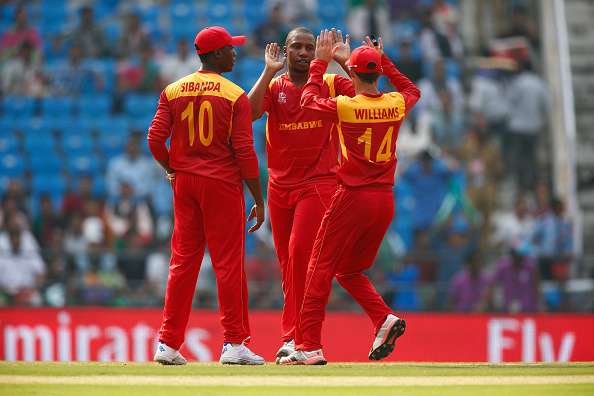By Tim Wigmore
Zimbabwe’s performances in their two Tests against New Zealand were actually less gruesome than many had envisaged, and the spirit showed by some of Zimbabwe’s batsmen – especially Sean Williams and Craig Ervine, who both scoredcenturies – was admirable.
Yet if Zimbabwe cleared the bar set for them, it only served to emphasise the desolate state of their cricket today. Consider this: Zimbabwe took 12 wickets in the series against New Zealand at 110.33 apiece, lost the two Tests by an innings and 117 runs and 254 runs but were still better than many had feared.
The decline of Zimbabwean cricket is one of the saddest tales in modern cricket, a story of talented players being systematically undermined by both the country’s politics and terrible administration from the board. It is easily forgotten now, but Zimbabwe were once a quietly formidable side.
In 1998, they defeated Pakistan and India in consecutive Test series; the following year they came fifth in the 1999 World Cup. This was the team of the Flowers, Murray Goodwin, Heath Streak and Henry Olonga; if they lacked star power, beyond Andy Flower and Streak, the side rose above their limitations through doggedness and often outstanding fielding.
Zimbabwe’s descent thereafter was dramatic. The side was decimated by the declining political situation, which led to Andy Flower and Olonga doing their remarkable black armband protests, mourning “the death of democracy in our beloved Zimbabwe” in 2003. The duo were among many premature retirements in an era of regular player strikes and terrible mismanagement.
So desolate had things become that, in 2004, the chairman of Zimbabwe Cricket telephoned the chairman of Sri Lanka Cricket, asking him to make Sri Lanka declare to stop humiliating Zimbabwe. Only when Sri Lanka had reached 713-3, after Marvan Atapattu and Kumar Sangakkara plundered double-centuries, did they finally oblige.
A year later, as the thrashings showed no sign of abating, Zimbabwe withdrew from Test cricket, and would only return in 2011. Under Alan Butcher, who documents his stint as head coach from 2010 to 2013 in The Good Murungu, Zimbabwe showed signs of promise, but all the good work was undone when the side played barely any cricket at all in 2012.
Internecine squabbling between the players and the board has returned, and Brendan Taylor, Zimbabwe’s best batsman, retired after the World Cup to boot. Dav Whatmore, who had initially helped Zimbabwe to a modest uplift in form after the World Cup, was also recently sacked.
The great sadness of Zimbabwe lies in the sheer waste. Players, including Taylor, Kyle Jarvis and Gary Ballance, have had nothing to keep them in the country. The best coaching talent – including the Flower brothers and Streak – were lost long ago. Administrators impatient for results to change barely give new recruits a chance to settle in: Zimbabwe got through three captains, three selection convenors, two bowling coaches and three batting coaches or consultants in the year after India’s tour last July. The country keeps on producing talented cricketers, but they are being let down, and there is no indication of this changing anytime soon.
Whatmore has said he envisages Zimbabwe collapsing “like Kenya”.
In their struggles, Zimbabwe have also been proof of the inequality in international cricket, and the sport’s disdain for meritocracy. By virtue of being a full member of the ICC, the board has been given huge sums of money by the ICC, with no accountability. As Whatmore put it: “They’re getting US$8-9m a year and they’ve got a debt of almost $20m.”
This money would have gone a lot further elsewhere: even now, Afghanistan and Ireland get about $5m less a year from the ICC; the next batch of associates, including Scotland, Nepal and the Netherlands, get about $7m a year less. These are indefensible differences, yet Zimbabwe have never had to justify their lofty status. Nor have they shown much interest in helping associates. They have often given the impression of being “scared” to play associates, as a senior ICC source put it last year.
This reticence has not only been bad for leading associates, it has been bad for Zimbabwe, too. Zimbabwe’s cricketers simply need to play as much as possible; indeed, one reason for Taylor’s international retirement was that he felt he was getting “stale” because he was not playing enough international cricket.
Zimbabwe are at least playing Afghanistan regularly now, but they still retain a curious and undeserved position, with the funding and voting rights of a full member but, increasingly a schedule little better than the top associates. Even Zimbabwe’s Test status is almost nominal: Zimbabwe went 20 months without playing a single Test before the series with New Zealand, even temporarily losing their Test ranking for playing so little.
They are reportedly cancelling a two-Test series against Sri Lanka, later this year, to fit in some more ODIs; when Afghanistan or Ireland would give so much to play a Test match, it seems almost insulting that Zimbabwe give the impression of caring so little for Tests.
More than anything, Zimbabwe’s plight is proof of why international cricket badly needs a meritocracy, which the ICC’s proposals to introduce two divisions in Tests – which Zimbabwe have suggested they oppose – and a 13-team ODI league is belatedly trying to rectify.
Having to prove themselves on the pitch to receive their cash from the ICC would force Zimbabwe’s administrators to lift their game, and stop letting their players down. So a merit-based system could be better for Zimbabwe – and it would certainly be better for all the other countries who can only dream of the funding and exposure Zimbabwe, for all their struggles, still receive.












